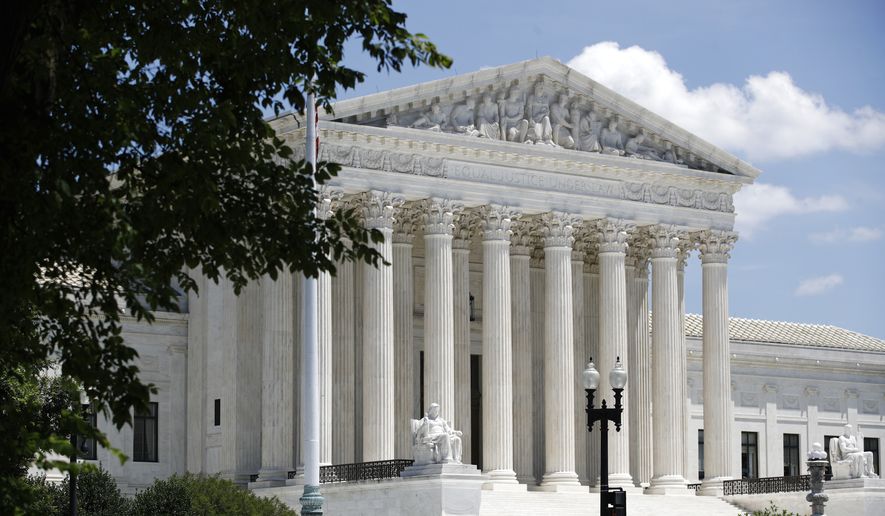The Supreme Court will take up former President Donald Trump’s “absolute immunity” defense Thursday, and a favorable ruling could nullify many of the criminal charges against him.
The case is groundbreaking. No other former president has been in Mr. Trump’s situation or asserted protection from prosecution for actions while in office.
Mr. Trump has asked the justices to dismiss a federal indictment accusing him of a conspiracy to subvert the 2020 election. He faces another federal criminal case over his handling of classified documents, a Georgia case over the 2020 election and a New York case over hush money payments before the 2016 election.
Experts said the cases dealing with Mr. Trump’s actions while in the White House could collapse if the justices accept his argument for broad immunity.
“There could be quite a ripple effect,” said Ted Cooperstein, an appellate lawyer representing defendants accused of crimes in the Jan. 6, 2021, riot at the U.S. Capitol.
Even a narrow ruling sending the election interference case back to lower courts to decide what constitutes an official act could delay trials, pushing the issue beyond the November election.
SEE ALSO: You’re on your own: Dems want to send Trump to prison without Secret Service protection
The case raises significant questions about the presidency, its powers and its leeway for action.
Mr. Trump argues that a president must be free from fear of legal jeopardy for “official acts.” Worrying about a later prosecution could leave the world’s most powerful official constrained at times requiring the most flexibility.
His attorneys told the Supreme Court that the only exception to absolute immunity is when the House impeaches and the Senate convicts and removes a president.
Short of that, allowing laws written by Congress and judged by the courts to constrain the president as coequal branches of government would upend the Constitution’s balance of power, Mr. Trump’s attorneys said.
“The Founders viewed protecting the independence of the Presidency as well worth the risk that some Presidents might evade punishment in marginal cases,” Mr. Trump’s attorneys argued in legal filings.
Special counsel Jack Smith, leading the two federal cases against Mr. Trump, calls those claims “novel and sweeping.” He said a former president must prove he was acting under a specific presidential power to claim immunity and Mr. Trump can’t point to any power he was exercising when he tried to upend the result of the 2020 election.
He said all previous presidents understood they could face criminal liability once out of office. Indeed, former President Richard Nixon accepted a pardon from his successor, President Ford.
“Nothing in constitutional text, history, precedent, or policy considerations supports the absolute immunity that petitioner seeks,” Mr. Smith told the justices in filings.
Curt Levey, president of the Committee for Justice, said a ruling in favor of Mr. Trump could affect Mr. Smith’s document handling case in a federal court in Florida and the election interference case in state court in Georgia.
He said the New York hush money case is different because Mr. Trump is accused of illegal actions while campaigning for president.
“I think in the Florida and the Georgia cases you have a stronger argument they are official acts,” Mr. Levey said.
Adam Feldman, a Supreme Court scholar and creator of the Empirical SCOTUS blog, said any impact on other prosecutions must be assessed on a case-by-case basis.
“All of this could very well lead to a longer delay. Assuming the immunity assertion is denied, this still pushes out the outcome of any proceeding that is dependent on the Supreme Court’s decision closer to the election, which is a win for Trump,” Mr. Feldman said.
The justices will hear oral arguments on Thursday.
A decision in the case is expected by the end of the court’s term in June.
The immunity argument has delayed Mr. Smith’s prosecution, and it is unclear whether the case will go to trial before Election Day.
Mr. Smith had asked the justices not to hear the dispute. He said the country deserves a speedy resolution to Mr. Trump’s case.
Of all the criminal cases Mr. Trump faces, the federal election subversion case is considered the marquee.
Mr. Smith secured the indictment based on actions Mr. Trump took after his 2020 election loss to Joseph R. Biden, including pressuring state officials and the Justice Department to find voter fraud, setting up false slates of electors in states he lost to Mr. Biden and leaning on Vice President Mike Pence to refuse to certify Electoral College votes from some states.
Mr. Trump says he was acting in his official capacity in trying to root out election fraud.
A district judge and then the U.S. Circuit Court of Appeals for the District of Columbia rejected Mr. Trump’s argument for absolute immunity.
“For the purpose of this criminal case, former President Trump has become citizen Trump, with all of the defenses of any other criminal defendant. But any executive immunity that may have protected him while he served as President no longer protects him against this prosecution,” the three-judge panel said in an unsigned opinion.
• Stephen Dinan can be reached at sdinan@washingtontimes.com.
• Alex Swoyer can be reached at aswoyer@washingtontimes.com.




Please read our comment policy before commenting.